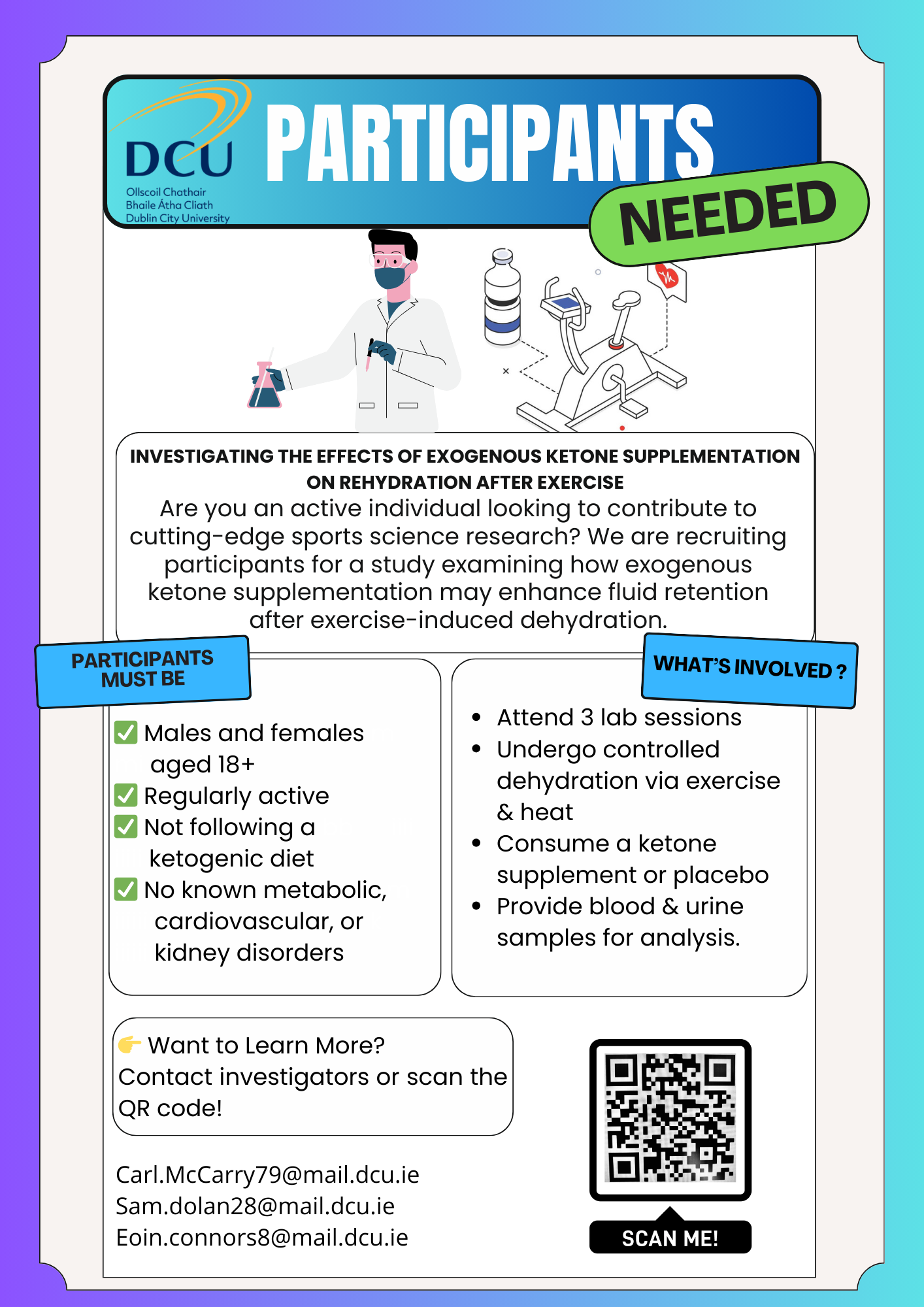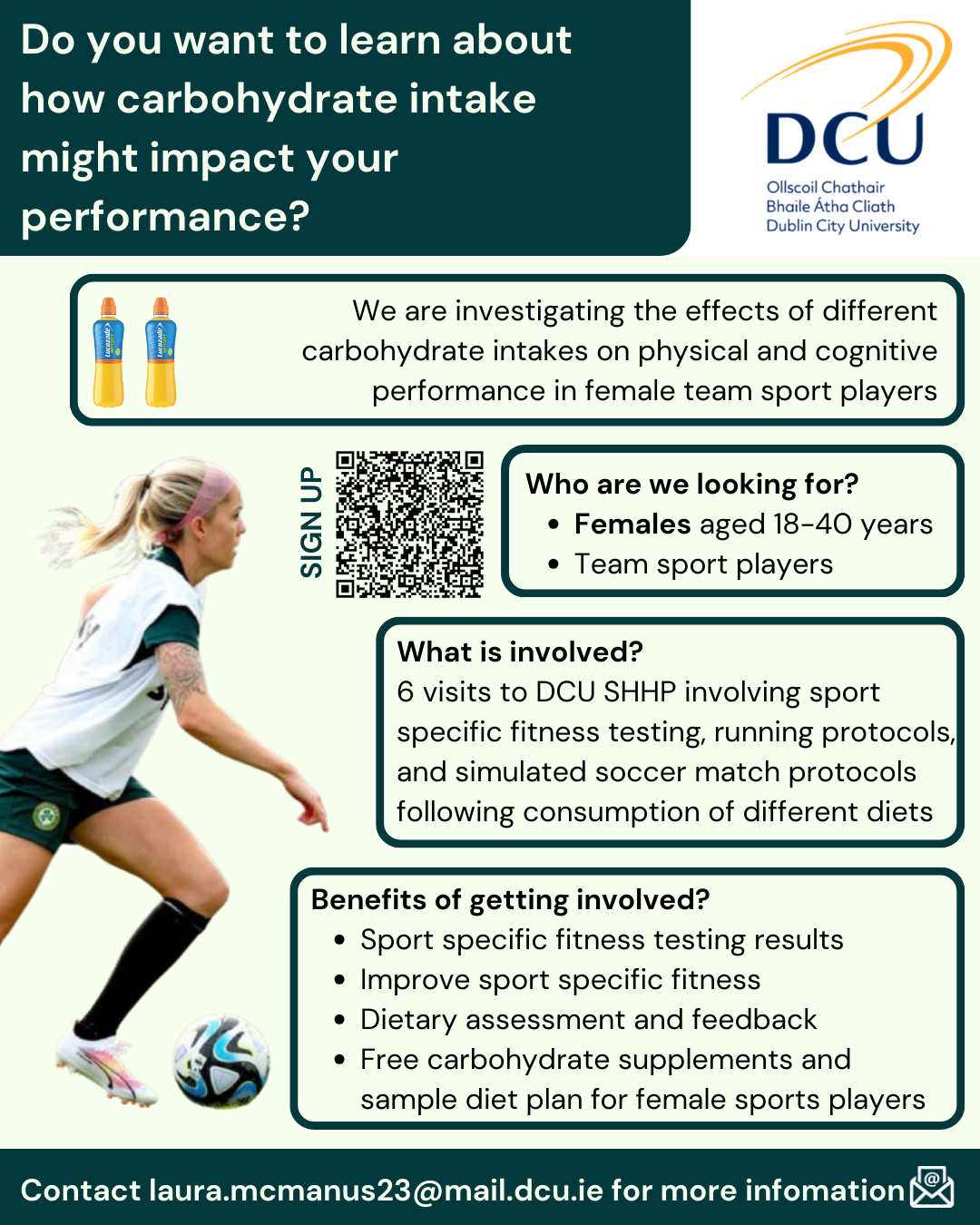

Current Research Projects Actively Recruiting
Below is a list of research projects that are currently actively recruiting participants taking place in the School of Health and Human Performance.
Stress urinary incontinence is a prevalent issue amongst active females, and is described as the involuntary leakage or urine during exercise. This can discourage females from exercising regularly, due to feelings of embarrassment and self-consciousness.
The aim of this study is to provide participants who experience stress urinary incontinence with a 4 week intervention, where they will receive pelvic floor muscle strengthening programmes. These programmes should help to reduce involuntary urine leakage, and will hopefully improve the quality of life of the participants.
Inclusion criteria:
Active females over the age of 18 years, experiencing stress urinary incontinence.
Requirements:
Two testing sessions in DCU, with a 4 week exercise intervention to improve pelvic floor muscle function.
Further information:
Working in the fitness industry is associated with multiple physical and mental demands. This study will investigate Irish fitness professionals perceptions of stress, burnout, work-family conflict, coping, and self-care practices.
Inclusion criteria:
Fitness professionals aged over 18 and currently working in any capacity (full time, part time etc.) in a gym or fitness centre in Ireland. For the purpose of this study, a fitness professional describes personal trainers, fitness instructors and group fitness instructors.
Requirements:
One 15-minute survey
Further information:
https://dcusurveys.qualtrics.com/jfe/form/SV_bPBZsRFq5LA8tDM
We're looking at well-being in Irish farming families. We are hoping to learn more about the experience of adult members of farming families (excluding farmers themselves or farm workers). With this research we aim to learn more about their mental health and their attitudes to seeking support for any challenges they might be facing.
Inclusion Criteria:
Member of an Irish farming family & over 18
Requirements:
20-25 minutes
Further Information:
https://dcusurveys.qualtrics.com/jfe/form/SV_25bUr4nqRFKuO2y
Exercise-induced dehydration can have a negative impact on both physical and cognitive performance. Contemporary research suggests that commercial ketone supplements that can be ingested to increase ketone body concentrations in the blood and may reduce urine output during exercise, but this effect on urine output has not been studied in the post-exercise period. Ketone supplements may be as a means to improve the rehydration process through this mechanism.
This study will explore whether taking an exogenous ketone supplement during a post-exercise period (after losing 2% of body mass thorough sweating) can help the body retain more fluid in the 4 hours following exercise.
Inclusion Criteria:
Adults (≥18 years and <40 years)
Participating in 150 minutes of moderate intensity physical activity per week
Free from injury and metabolic illness
Capable of cycling on a stationary bike for ~60 minutes
Requirements:
Three visits lasting approximately 6 hours (but participants are welcome to work, watch TV, etc during that time)
Contact Details:

This study aims to investigate the impact of different carbohydrate intakes on physical and cognitive performance during a simulated soccer protocol in female team sport players. Increasing carbohydrate intake has been found to improve physical and cognitive performance during matches and simulated soccer protocols in male soccer players. However, to date no studies have looked at this in female team sport/soccer players. Female populations possess unique physiological profiles and therefore, their carbohydrate needs around exercise may differ from males.
Inclusion Criteria:
We are looking for female team sport players to take part. The inclusion criteria are as follows:
· Female
· Between the age of 18 and 40 years
· Actively training with (2 or more training sessions a week when in-season) and playing competitive matches for a team-sport based team (i.e soccer, GAA, basketball, hockey etc)
· Not carrying any long-term injuries or illnesses that effect participation in training sessions/matches
· Not pregnant or have not been pregnant within the last year
Requirements:
If you decide to take part in this research, you will be asked to report to the Human Performance Laboratory at the DCU School of Human Health and Performance for 6 separate visits over the course of 3 to 5 weeks depending on your availability/own training schedule. Visits involve sport specific fitness testing, treadmill running protocols, and simulated soccer match protocols following consumption of different diets.
Further Information:
Contact Email: laura.mcmanus23@mail.dcu.ie

